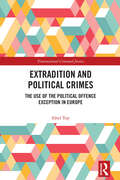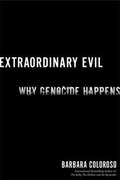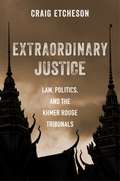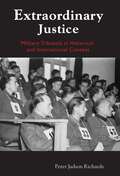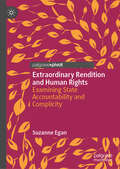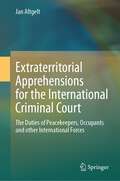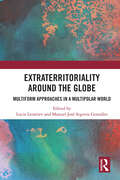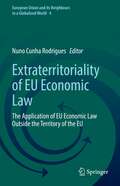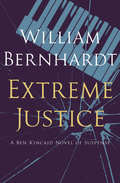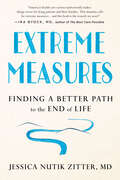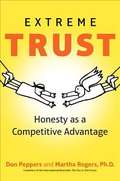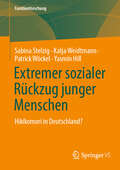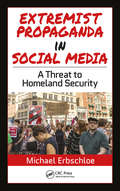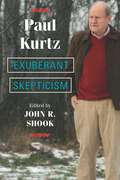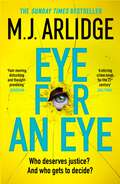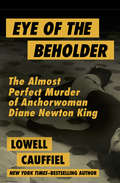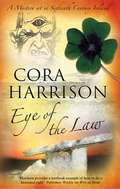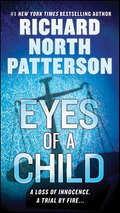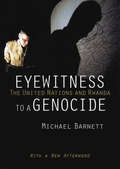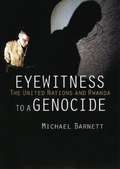- Table View
- List View
Extradition and Political Crimes: The Use of the Political Offence Exception in Europe (Transnational Criminal Justice)
by Sibel TopThis book examines the evolution and current application of the political offence exception clause to extradition in Europe.The long-standing academic exploration of terrorism has recently given way to renewed interest in the political offence exception to extradition, prompted by recent events that signal a democratic downturn globally. Despite the significant curtailment – and, in some cases, the complete abolition – of the political offence exception to extradition in Europe, certain European states continue to quietly implement this exception to deny extradition requests. This work studies the development of the political offence exception in Europe by narrowing its focus from an international perspective to the European context, specifically examining the Council of Europe and the European Union, before zeroing in on the Catalan independence crisis, which offers a particularly valuable case for analysing the application of the political offence exception in the European context.By providing a detailed examination of the evolving protections for political offenders within European legal frameworks, the text updates the long overdue academic knowledge on the matter. It is therefore an essential resource for anyone interested in European criminal law and extradition, in particular. It will also be of interest to researchers, academics, and policy-makers working in the areas of criminal law, human rights law, legal theory, criminology, and political science.
Extraordinary Evil: A Short Walk To Genocide
by Barbara ColorosoFrom best-selling author Barbara Coloroso comes a timely and essential book about genocide. Through an examination of three clearly defined genocides ? the Armenian and Rwandan genocides, and the European Holocaust ? Coloroso deconstructs the causes and consequences, both to its immediate victims and to the fabric of the world at large, and proposes the conditions that must exist in order to eradicate this evil from the world. Coloroso is well known for her best-selling books that explore why children bully. In Extraordinary Evil she builds upon that research to explain why the impulse to bully is mirrored by the act of genocide. By linking the psychology of the bully to the motivation that leads a community to murder, Coloroso provides devastating and vital insight into why people kill their neighbors. Based on the author's 15 years of research and extensive travel, Extraordinary Evil is an urgently needed work in an age when acts of genocide seem to occur more frequently and are in the public's consciousness more than ever before.
Extraordinary Justice: Law, Politics, and the Khmer Rouge Tribunals
by Craig EtchesonIn just a few short years, the Khmer Rouge presided over one of the twentieth century’s cruelest reigns of terror. Since its 1979 overthrow, there have been several attempts to hold the perpetrators accountable, from a People’s Revolutionary Tribunal shortly afterward through the early 2000s Extraordinary Chambers in the Courts of Cambodia, also known as the Khmer Rouge Tribunal. Extraordinary Justice offers a definitive account of the quest for justice in Cambodia that uses this history to develop a theoretical framework for understanding the interaction between law and politics in war crimes tribunals.Craig Etcheson, one of the world’s foremost experts on the Cambodian genocide and its aftermath, draws on decades of experience to trace the evolution of transitional justice in the country from the late 1970s to the present. He considers how war crimes tribunals come into existence, how they operate and unfold, and what happens in their wake. Etcheson argues that the concepts of legality that hold sway in such tribunals should be understood in terms of their orientation toward politics, both in the Khmer Rouge Tribunal and generally. A magisterial chronicle of the inner workings of postconflict justice, Extraordinary Justice challenges understandings of the relationship between politics and the law, with important implications for the future of attempts to seek accountability for crimes against humanity.
Extraordinary Justice: Military Tribunals in Historical and International Context
by Peter Judson RichardsExamines the ways military tribunals seek to administer justiceThe Al-Qaeda terror attacks of September 11, 2001 aroused a number of extraordinary counter measures in response, including an executive order authorizing the creation of military tribunals or “commissions” for the trial of accused terrorists. The Supreme Court has weighed in on the topic with some controversial and deeply divided decisions.Extraordinary Justice seeks to fill an important gap in our understanding of what military tribunals are, how they function, and how successful they are in administering justice by placing them in comparative and historical context. Peter Judson Richards examines tribunals in four modern conflicts: the American Civil War, the British experience in the Boer War, the French tribunals of the “Great War,” and Allied practices during the Second World War.Richards also examines the larger context of specific political, legal and military concerns, addressing scholarly and policy debates that continually arise in connection with the implementation of these extraordinary measures. He concludes that while the record of the national tribunals has been mixed, enduring elements in the character of warfare, of justice, and the nature of political reality together justify their continued use in certain situations.
Extraordinary Rendition and Human Rights: Examining State Accountability and Complicity
by Suzanne EganThis book explores the potential of international human rights law to resolve one of the gravest human rights violations to have surfaced post 9/11: extraordinary rendition. Although infamously deployed as a counter-terrorism technique, substantial evidence confirms that European states colluded in the practice by facilitating the transportation of suspects through their airspace or airports and in some cases, secret detention on their territories. Despite recent findings of the European Court of Human Rights, difficulties persist in holding many European States accountable for the role they played both at the domestic and international level. Distinguishing between various forms of accountability and interrogating the evolving parameters of international human rights law, this volume will fill gaps in extraordinary rendition literature and influence the policies of European States.
Extraterritorial Apprehensions for the International Criminal Court: The Duties of Peacekeepers, Occupants and other International Forces
by Jan AltgeltThe starting point of this book is the generally shared observation that in violence-torn areas of limited statehood, the civilian population is often subject to deliberate attacks. This violence often escalates to core crimes such as war crimes, crimes against humanity and even genocide. The International Criminal Court (ICC) could potentially deter such crimes. In order to do so, it largely depends on the cooperation of the states on the territory of which alleged core criminals operate. Since such states are often unwilling or unable to cooperate, the book explores whether the ICC could instead seek assistance from international forces such as UN peace support operations, UN-mandated missions, and belligerent occupants.The book covers, on the one hand, the law and practice of the UN Security Council with regard to mandating international forces to arrest and transfer alleged offenders to the ICC or to other international courts. On the other, it addresses to what extent international forces may or must hand alleged offenders over to the ICC, regardless of such mandates. More precisely, the book examines whether the duties to prosecute genocide, torture, enforced disappearance, grave breaches and other war crimes apply extraterritorially and – if so – whether international forces can discharge these duties by transferring suspects to the ICC.At the same time, the book addresses the limitations to such extraterritorial action: firstly, to what extent the prohibition of the use of force and the principle of territorial sovereignty restrict extraterritorial deprivations of liberty and transfer to the ICC. Secondly, it explores the restrictions and permissions that the law of occupation and other norms of international humanitarian law impose on such apprehensions and transfers. Finally, it discusses how international forces can uphold the right to liberty and security as well as the principle of non-refoulement when they extraterritorially apprehend ICC suspects. This also reflects the book’s relevance with regard to the more general debate on the extraterritorial application of human rights.
Extraterritoriality Around the Globe: Multiform Approaches in a Multipolar World
by Lucia Leontiev Manuel José Segovia GonzálezAnalysing different political and policy drivers of extraterritoriality in various social, cultural, and economic settings, this book assesses the value of politics within the context of the law and practice of extraterritoriality.Extraterritoriality is one of the most complex and multifaceted concepts in international law, shaped by a dynamic interplay of legal, political, and practical factors. This book discusses the challenges of understanding extraterritoriality in the context of evolving international relations, the political forces behind state practices, and why international law matters in a field that, at first glance, may seem primarily national in scope. To address these issues, this book includes 12 case studies that explore extraterritoriality from a national perspective, offering both thematic and geographic breadth. It analyses the political drivers of extraterritoriality among similar countries to assess and prove their value. By examining states’ extraterritorial behaviour, the book provides a more nuanced, empirical perspective on extraterritoriality, highlighting emerging trends and offering insights into its role in shaping global, legal, and political landscapes in the 21st century.This book will be of interest to researchers and practitioners in the field of extraterritoriality, law, and politics.
Extraterritoriality of EU Economic Law: The Application of EU Economic Law Outside the Territory of the EU (European Union and its Neighbours in a Globalized World #4)
by Nuno Cunha RodriguesThis book sheds new light on the potential application of EU law to situations arising outside EU territory, and its consequences. In today’s globalized world, EU law and the ECJ’s decisions have been calling for exceptions and defining new connecting elements that make the traditional approach of EU law, based on the territoriality principle, less straightforward. This is the case with e.g. the effects doctrine in the context of EU competition law, as was fully recognized after the ECJ’s Intel case. Moreover, recently approved rules concerning the EU’s internal market, EU environmental law and EU data protection law have made it more difficult to define the application of EU law in terms of a pure link to the territoriality principle. The book examines these and other problems from the perspectives of various branches of EU economic law. With regard to EU competition law it presents, among others, studies on the evolution of the effects doctrine in the US and the EU; extraterritoriality of competition law; global cartels; merger control; state aid and cooperation between NCAs. Furthermore, it includes several studies concerning extraterritorial issues in trade relations between the EU and China; EU screening regulation of foreign direct investments; EU trade agreements; EU investment law and EU financial services. The twenty-one contributing authors are internationally respected experts on EU law.
Extreme Justice (The Ben Kincaid Novels #7)
by William BernhardtRetired from law, Ben Kincaid is forced to return to the bar when a case--and a corpse--fall in his lapAfter years of struggling, Ben Kincaid shuts down his small legal office and decides to make a living doing something that--compared to practicing law in Tulsa--is easy money: playing jazz piano. He buys a minivan to haul his gear, and gets steady gigs playing in a combo at Uncle Earl's Jazz Emporium. His new career is just starting to take off when a body falls from the Emporium ceiling, knocking the wind out of Kincaid and sending him right back to his old profession. The dead woman is Cajun Lily Campbell, a grand dame of the Tulsa music scene and onetime girlfriend of Uncle Earl himself. And Kincaid must be careful as he readies the old jazzman's defense, because there is a killer on the north side of town who would like nothing more than to hear the piano player's last tune.
Extreme Measures: Finding a Better Path to the End of Life
by Jessica Nutik ZitterAn ICU and Palliative Care specialist featured in the Oscar-nominated Netflix documentary Extremis offers a framework for a better way to exit life that will change our medical culture at the deepest levelIn medical school, no one teaches you how to let a patient die. Jessica Zitter became a doctor because she wanted to be a hero. She elected to specialize in critical care—to become an ICU physician—and imagined herself swooping in to rescue patients from the brink of death. But then during her first code she found herself cracking the ribs of a patient so old and frail it was unimaginable he would ever come back to life. She began to question her choice. Extreme Measures charts Zitter’s journey from wanting to be one kind of hero to becoming another—a doctor who prioritizes the patient’s values and preferences in an environment where the default choice is the extreme use of technology. In our current medical culture, the old and the ill are put on what she terms the End-of-Life Conveyor belt. They are intubated, catheterized, and even shelved away in care facilities to suffer their final days alone, confused, and often in pain. In her work Zitter has learned what patients fear more than death itself: the prospect of dying badly. She builds bridges between patients and caregivers, formulates plans to allay patients’ pain and anxiety, and enlists the support of loved ones so that life can end well, even beautifully. Filled with rich patient stories that make a compelling medical narrative, Extreme Measures enlarges the national conversation as it thoughtfully and compassionately examines an experience that defines being human.
Extreme Trust: Honesty as a Competitive Advantage
by Don Peppers Martha RogersHow companies can stay competitive in a world of total transparency. With their first book, 1993's The One-to-One Future, Don Peppers and Martha Rogers introduced the idea of managing interactive customer relationships, long before the Web and social networking made it standard business practice. With Extreme Trust, they look to the future once again, predicting that rising levels of transparency will require companies to protect the interests of their customers and employees proactively, even when it sometimes costs money in the short term. The importance of this "trustability" will transform every industry. Retail banks won't be able to rely as much on overdraft charges. Consumers will expect retailers to remind them when they have unused balances on gift cards. Credit card companies will coach customers to avoid excessive borrowing. Cell phone providers will help customers find appropriate calling plans for their usage patterns. Success won't come from top-down rules and processes, but from bottom-up solutions on the part of employees and customers themselves. And the most successful businesses will earn and keep the extreme trust of everyone they interact with
Extremer sozialer Rückzug junger Menschen: Hikikomori in Deutschland? (Familienforschung)
by Katja Weidtmann Sabina Stelzig Patrick Wöckel Yasmin HillDer Band bietet einen systematischen Überblick über das Phänomen extremer sozialer Rückzüge junger Menschen, das in Japan unter dem Begriff „Hikikomori&“ bekannt ist. Dieser Begriff bezeichnet die langfristige Selbstisolation junger Menschen vor der Gesellschaft, ohne dass vorrangig eine psychische Erkrankung vorliegt. Die Person im sozialen Rückzug wird zumeist - allerdings ohne einen direkten Kontakt - durch ihre Familie versorgt. Das Buchprojekt nähert sich dem Thema umfassend aus einer interdisziplinären Sicht. Dabei geraten nicht nur das Individuum selbst, sondern das gesamte Familiensystem sowie die es umgebenden kulturellen und gesellschaftliche Bedingungen in den Blick. Vor dem Hintergrund einiger Fallbeispiele wird diskutiert, ob der Rückzug von jungen Menschen aus der Gesellschaft auch in Deutschland sinnvoll mit dem Phänomen „Hikikomori&“ beschrieben werden kann. Denn während in Japan seit den 1990 Jahren auch auf staatlicher Ebene vielfältige unterstützende Präventions- und Interventionsformen entwickelt wurden, fallen in Deutschland junge Menschen im extremen sozialen Rückzug und ihre Angehörigen bislang durch fast alle Raster.
Extremism: A Philosophical Analysis
by Quassim CassamExtremism is one of the most charged and controversial issues of the twenty-first century. Despite myriad programs of deradicalization and prevention around the world, it remains an intractable and poorly understood problem. Yet it is also sometimes regarded as a positive force – according to Martin Luther King Jr., 'the question is not whether we will be extremists, but what kind of extremists we will be'. In this much-needed and lucid book, Quassim Cassam identifies three types of extremism – ideological; methods; and psychological extremism – and discusses the following fundamental topics and issues: What is extremism? What are the methods adopted by extremists? Is there an extremist ‘mindset’ and if so, what is it? What role do ideas of purity, victimhood and humiliation play in understanding extremism? How does extremism differ from fanaticism and fundamentalism? How does one become an extremist and how should we understand deradicalization? Throughout the book, Quassim Cassam uses many compelling examples, ranging from the Khmer Rouge, the IRA, Al-Qaeda and Timothy McVeigh to Philip Roth’s novel American Pastoral and counter-extremism programmes, including the UK’s Prevent strategy. Clear-headed and engaging, Extremism: A Philosophical Analysis is essential reading for anyone interested in this important topic, not only in Philosophy but related disciplines such as Politics and International Relations, Conflict and Terrorism Studies, Law, Education and Religion. It will also be of great interest to policy-makers and those engaged in understanding extremism at any level.
Extremist Propaganda in Social Media: A Threat to Homeland Security
by Michael ErbschloeExtremist Propaganda in Social Media: A Threat to Homeland Security presents both an analysis of the impact of propaganda in social media and the rise of extremism in mass society from technological and social perspectives. The book identifies the current phenomenon, what shall be dubbed for purposes of this book "Blisstopian Societies"—characterized in the abiding "ignorance is bliss" principle—whereby a population is complacent and has unquestioning acceptance of a social doctrine without challenge and introspection. In these subcultures, the malleable population self-select social media content, "news," and propaganda delivery mechanisms. By doing so, they expose themselves only to content that motivates, reinforces, and contributes to their isolation, alienation, and self-regulation of the social groups and individuals. In doing this, objective news is dismissed, fake—or news otherwise intended to misinform—reinforces their stereotyped beliefs about society and the world around them. This phenomenon is, unfortunately, not "fake news," but a real threat to which counterterror, intelligence, Homeland Security, law enforcement, the military, and global organizations must be hyper-vigilant of, now and into the foreseeable future. Chapters cite numerous examples from the 2016 political election, the Russia investigation into the Trump Campaign, ISIS, domestic US terrorists, among many other examples of extremist and radicalizing rhetoric. The book illustrates throughout that this contrived and manufactured bliss has fueled the rise and perpetuation of hate crimes, radicalism, and violence in such groups as ISIS, Boko Haram, Neo-Nazis, white separatists, and white supremacists in the United States—in addition to perpetuating ethnic cleansing actions around the world. This dynamic has led to increased political polarization in the United States and abroad, while furthering an unwillingness and inability to both compromise or see others’ perspectives—further fomenting insular populations increasing willing to harm others and do violence. Extremist Propaganda in Social Media relates current Blisstopian practices to real-world hate speech and violence, connecting how such information is consumed by groups and translated into violent action. The book is an invaluable resources for those professionals that require an awareness of social media radicalization including: social media strategists, law enforcement, Homeland Security professionals, military planners and operatives—anyone tasked with countering combat such violent factions and fringes in conflict situations.
Exuberant Skepticism
by Paul KurtzFor more than three decades, philosopher Paul Kurtz has been a strong advocate of skepticism, not only as a philosophical position, but also as a fulfilling way of life. Contrary to the view that skepticism is merely a negative, nay saying, or debunking stance toward commonly held beliefs, skepticism as defined by Kurtz emerges reborn as "skeptical inquiry"-a decidedly positive philosophy ready and able to change the world. In this definitive collection, editor John R. Shook has gathered together seventeen of Paul Kurtz's most penetrating and insightful writings. Altogether these essays build an affirmative case for what can be known based on sound common sense, reason, and scientific method. And as each essay cogently and convincingly explains, so much can be known, from the natural world around us to the moral responsibilities among us. The work is organized in four topical sections. In the first, "Reasons to Be Skeptical," Kurtz presents compelling reasons why the methods of inquiry used by the sciences deserve respect. In short, science provides reliable knowledge, without which humanity would never have emerged from the age of myth and widespread ignorance. In the second section, "Skepticism and the Non-Natural," Kurtz shows how skeptical inquiry can be fruitfully used to critique both paranormal claims and religious worldviews. He also investigates whether science and religion can be compatible. In the third section, "Skepticism in the Human World," he considers how skeptical inquiry can be applied to politics, ethics, and pursuit of the good life. Realizing the essential connections between scientific knowledge, technological power, and social progress, Kurtz has understood, as few philosophers ever have, how the methods of intelligence can be applied to all areas of human endeavor. The book concludes with Kurtz's authoritative reflections on the skeptical movement that he founded and has led. As he explains, the forces of blind faith and stubborn unreason still fight for control of the mind, so the skeptic can never rest. If there is a brighter future for humanity, a future in which every person enjoys a realistic opportunity for the pursuit of excellence, Kurtz's 'exuberant skepticism' can show us the way.
Eye Wonder: Open Your Eyes to a World of Discovery (Eye Wonder)
by DKIf your child fascinated with pirates? Eye Wonder: Pirates is the perfect tool to encourage your child to explore and learn about the subjects that already hold an interest — and pirates are fascinating to children and adults alike! Eye Wonder: Pirates is packed with pictures and activities to appeal to visual learners, and the book takes us right into the fascinating world of pirates! Learn about pirate ships and pirate weapons, see what life was like on the deck of a pirate ship, and discover what it really meant to "walk the plank"! From the corsairs and Blackbeard, right up to modern pirates, Eye Wonder: Pirates has it all! We've added eight pages of new activities to keep your child engaged, too. Visual learners and readers alike will love exploring and learning through Eye Wonder: Pirates. These books are designed to teach through pictures and a visual approach, encouraging curiosity in young, school-age children. We've added games, activities, and quizzes to engage children even more — Eye Wonder: Pirates activities are designed to teach kids to both remember more of what they've learned, and learn to research when they want to know more, teaching general study skills as well as pirate-specific knowledge. Learn about science, history, and the natural world through beautiful photography and lively, age-appropriate text. The Eye Wonder series organizes information in a way that's easy to search, easy to read, and easy to learn.
Eye for An Eye: The Richard & Judy Winter 2024 Book Club thriller that will get everyone talking
by M. J. ArlidgeOUR MOST NOTORIOUS CRIMINALS HAVE HIDDEN IN PLAIN SIGHT.UNTIL NOW...'Emily' is a devoted single mother.'Jack' starts a new job in a new town.They both share the same secret: neither of them are who they say they are.They are among only nine criminals in the UK who have been granted lifelong anonymity, for their own safety, because of their terrible crimes. But what if someone exposed their true identities to the families of their victims, who are desperate for revenge? Probation officer Olivia Campbell is caught in the crossfire of this crisis - and as the search for the mole behind it all intensifies, so too does the hunt for the vigilante killers let loose by the leaks...RIGHT OR WRONG?CRIMINAL OR VICTIM? REDEMPTION OR REVENGE?*****Praise for AN EYE FOR AN EYE: 'A big, bold, twisting thriller' CHRIS WHITAKER 'A thought-provoking masterclass' DANIEL COLE'A propulsive thriller ... Fast-moving, disturbing and thought-provoking' GUARDIAN, Thrillers of the Month 'A stirring crime novel for the 21st century' DAILY MAIL 'There are no easy answers in this thoughtful, harrowing thriller' THE SUN 'Impressive and compassionate, Eye For An Eye should win prizes' LITERARY REVIEW #EyeForAnEye
Eye for An Eye: The Richard & Judy Winter 2024 Book Club thriller that will get everyone talking
by M. J. ArlidgeOUR MOST NOTORIOUS CRIMINALS HAVE HIDDEN IN PLAIN SIGHT.UNTIL NOW...'Emily' is a devoted single mother.'Jack' starts a new job in a new town.They both share the same secret: neither of them are who they say they are.They are among only nine criminals in the UK who have been granted lifelong anonymity, for their own safety, because of their terrible crimes. But what if someone exposed their true identities to the families of their victims, who are desperate for revenge? Probation officer Olivia Campbell is caught in the crossfire of this crisis - and as the search for the mole behind it all intensifies, so too does the hunt for the vigilante killers let loose by the leaks...RIGHT OR WRONG?CRIMINAL OR VICTIM? REDEMPTION OR REVENGE?*****Praise for AN EYE FOR AN EYE: 'A big, bold, twisting thriller' CHRIS WHITAKER 'A thought-provoking masterclass' DANIEL COLE'A propulsive thriller ... Fast-moving, disturbing and thought-provoking' GUARDIAN, Thrillers of the Month 'A stirring crime novel for the 21st century' DAILY MAIL 'There are no easy answers in this thoughtful, harrowing thriller' THE SUN 'Impressive and compassionate, Eye For An Eye should win prizes' LITERARY REVIEW #EyeForAnEye
Eye of the Beholder: The Almost Perfect Murder of Anchorwoman Diane Newton King
by Lowell Cauffiel&“A fascinating psychological study of an unrepentant murderer&” from a New York Times–bestselling author (Library Journal). Battle Creek, Michigan, is famous as the birthplace of breakfast cereal, and the nearby suburb of Marshall is as wholesome as shredded wheat. Well-known for its colorful Victorian mansions, this stately slice of nineteenth-century Americana became infamous on a frigid night in February of 1991. Newscaster Diane Newton King was stepping out of her car, her children strapped into the backseat, when a sniper&’s bullet cut her down. The police assumed that the killer was her stalker—a crazed fan who had been terrorizing King for weeks. But as their investigation ground to a standstill, the police turned to another suspect—one much closer to home. In this gripping retelling of the crime and its aftermath, journalist Lowell Cauffiel re-creates the atmosphere of terror that marked King&’s last days, giving us a story of celebrity, obsession, and what it means to kill.
Eye of the Beholder: The Almost Perfect Murder of Anchorwoman Diane Newton King
by Lowell Cauffiel&“A fascinating psychological study of an unrepentant murderer&” from a New York Times–bestselling author (Library Journal). Battle Creek, Michigan, is famous as the birthplace of breakfast cereal, and the nearby suburb of Marshall is as wholesome as shredded wheat. Well-known for its colorful Victorian mansions, this stately slice of nineteenth-century Americana became infamous on a frigid night in February of 1991. Newscaster Diane Newton King was stepping out of her car, her children strapped into the backseat, when a sniper&’s bullet cut her down. The police assumed that the killer was her stalker—a crazed fan who had been terrorizing King for weeks. But as their investigation ground to a standstill, the police turned to another suspect—one much closer to home. In this gripping retelling of the crime and its aftermath, journalist Lowell Cauffiel re-creates the atmosphere of terror that marked King&’s last days, giving us a story of celebrity, obsession, and what it means to kill.
Eye of the Law: A Mystery of Medieval Ireland (Burren Mysteries #5)
by Cora HarrisonA Mystery of Medieval Ireland--1510. A great feast is being held. Into a crowd listening to the story of Balor, the one-eyed god, come two strangers. The younger of the two, Iarla, bears a letter that claims that the wealthy Ardal O'Lochlainn is his true father--which Ardal vociferously denies. So when Iarla is found dead, with one eye missing, some think he was killed by the god--but most suspect Ardal. Mara, the Brehon--or lawgiver--of the Burren, is called to investigate.
Eyes of a Child (Christopher Paget #3)
by Richard North PattersonTerri Peralta and Richie Arias have been married for six years, but the only good thing they have to show for the union is their daughter, Elena. Now Terri has left Richie and fallen in love with her lawyer-boss, Chris Paget; meanwhile, Richie, a manipulative slimeball capable of deceptive charm, convinces the judge he's a caring father who should have custody of Elena. Terri, devastated, goes off to Italy with Chris to decide if they really love each other. When they return, Richie is dead, supposedly a suicide. Of course, the police have doubts, and the ensuing trial, where Chris must defend himself against murder charges, is the book's main event.
Eyes of a Child: A Thriller
by Richard North PattersonA man has been found dead, a gun still wedged in his mouth. It looks like Ricardo Arias killed himself…but the physical evidence tells a different story, in Richard North Patterson's riveting legal thriller, Eyes of a Child.The police investigation turns up all sorts of troubling data—a bitter estrangement between Ricardo and his wife, Terri; an ugly custody battle over their six-year-old daughter, Elena; charges of child molestation. And before long there's a murder suspect: San Francisco defense attorney and political hopeful Christopher Paget.But where's the motive? It could be that Paget is Terri's new lover. Or that Paget's own teenage son is the one who's accused of abusing Elena. But a series of long-hidden secrets—on both sides of the case—are slowly rising to the surface…and threaten to explode in the courtroom, where the final verdict will be delivered. Where the truth about what really happened to Ricardo Arias will either be revealed—or buried for good...
Eyewitness To A Genocide
by Michael BarnettWhy was the UN a bystander during the Rwandan genocide? Do its sins of omission leave it morally responsible for the hundreds of thousands of dead? Michael Barnett, who worked at the U. S. Mission to the United Nations from 1993 to 1994, covered Rwanda for much of the genocide. Based on his first-hand experiences, archival work, and interviews with many key participants, he reconstructs the history of the UN's involvement in Rwanda. In the weeks leading up to the genocide, the author documents, the UN was increasingly aware or had good reason to suspect that Rwanda was a site of crimes against humanity. Yet it failed to act. Barnett argues that its indifference was driven not by incompetence or cynicism but rather by reasoned choices cradled by moral considerations. Employing a novel approach to ethics in practice and in relationship to international organizations, Barnett offers an unsettling possibility: the UN culture recast the ethical commitments of well-intentioned individuals, arresting any duty to aid at the outset of the genocide. Barnett argues that the UN bears some moral responsibility for the genocide. Particularly disturbing is his observation that not only did the UN violate its moral responsibilities, but also that many in New York believed that they were "doing the right thing" as they did so. Barnett addresses the ways in which the Rwandan genocide raises a warning about this age of humanitarianism and concludes by asking whether it is possible to build moral institutions.
Eyewitness to a Genocide: The United Nations and Rwanda
by Michael BarnettVery little about the Rwandan genocide is comprehensible. A Hutu elite came to believe that Hutu salvation necessitated Tutsi extermination. The Hutus enacted their conspiracy with startling efficiency. In one hundred days, between April 6 and July 19, 1994, they murdered roughly eight hundred thousand individuals. For the statistically inclined, that works out to 333&1/3 deaths per hour, 5&1/2 deaths per minute. The rate of murder was even greater during the first four weeks, when most of the deaths occurred. The Rwandan genocide, therefore, has the macabre distinction of exceeding the rate of killing attained during the Holocaust.
